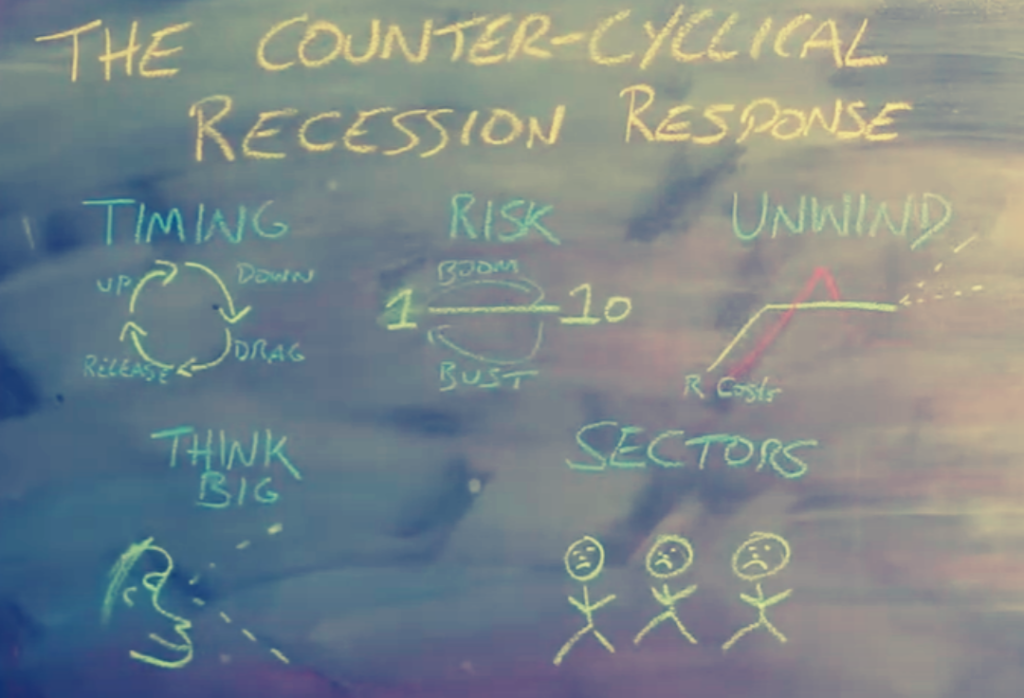The Necessity of a Counter-Cyclical Recession Response. In Blackboard Fridays Episode 111, Jacob talks about Growth Planning. Need this implemented into your business? Talk to the international business advisor who can do exactly that – Contact Jacob, Learn More, or Subscribe for Updates.
Are we in a Recession yet? After all, there’s plenty of good forecasters who are saying 2019 is the year.
Personally, I don’t buy into all the doom and gloom – there are also plenty of forecasters who have predicted 8 of the last 2 recessions! I’m much more practical – if there’s a small risk of a big economic downturn, what’s the simple thing I can do to make sure my business and I are ready to respond?
Sound helpful for you? Then watch this week’s episode where I walk through 5 of the most common mistakes founders and CEOs make with their business in a recession.
It turns out the natural reaction, driven by fear, causes an awful lot of the actual problems. Do the opposite (more or less) and you’ll be much better off.
Incidentally, most of these mistakes have corollaries in economic good times – that’s the time when fear shows up looking like greed, and businesses set themselves up for fragility and failure.
So whether you’re feeling sensible, or on top of the world, watch this week’s episode here.
Who is Jacob Aldridge, Business Coach?
“The smart and quirky advisor who gets sh!t done in business.” Back independent since 2019.
Since April 2006, I’ve been an international business advisor providing bespoke solutions for privately-owned businesses with 12-96 employees.
At this stage you have proven your business model, but you’re struggling to turn aspirations into day-to-day reality. You are still responsible for all 28 areas of your business, but you don’t have the time or budget to hire 28 different experts.
You need 1 person you can trust who can show you how everything in your business is connected, and which areas to prioritise first.
That’s me.
Learn more here. Or Let’s chat.
Blackboard Fridays Episode #111 – The Necessity of a Counter-Cyclical Recession Response
A few weeks ago, I talked about the different types of recession, some of the lead indicators that you might want to keep an eye out for because even though Australia hasn’t had a recession for a generation, there is one coming it will be here inevitably and the best business leaders are the ones who are prepared and ready to respond. I promised in that video to talk through some of the different ways to plan and to respond to a recession.
Now ultimately the response you need will depend on your business and exactly what type of economic circumstances are going on which type of those three recessions you endure but it’s important to understand the common reaction that people have (even CEOs and experienced business leaders) when a recession arrives.
If you can fight against some of that common reaction, if you can act in a counter cyclical nature when you respond with your business, then your business will respond better and may even come out ahead as a result of that recession.
Recession Readiness 101
There are five key rules, most common mistakes, and opportunities in a recession. I’m going to walk through each of these very briefly.

1. Timing is Key
The first is around timing. If you think of the economic cycle as having four phases there’s a downturn, a drag at the bottom where people are unsure, there’s a release where the confidence comes back into the market and then there’s the ultimate upswing all the way up to the boom at the top.
Most CEOs are implementing business strategies that are one phase behind where the economic cycle is and where their business needs to be so during a downturn they’re often still implementing the boom time strategies, the things that worked when the going was good and those things are not going to work when circumstances change.
This is why I often say it’s important to have a recession plan, not a big detailed thing but just a plan that sits in your bottom drawer or into your strategy file on your computer so that you can pull that out when circumstances change and respond faster by being where the market is and where it’s heading not one step behind.
2. Risk and Resilience
The second, and you might want to watch Blackboard Fridays episode 13 where we talk about risk profile in more detail. In that, I encourage you, especially if you have business partners, to set a risk profile for the business, for example, seven out of ten. What happens during a boom is that naturally our risk appetite increases. It’s why everybody flooded into bitcoin in 2017 because it felt like it was going to go up forever so we threw caution to the wind and took a risk.

When a recession occurs the opposite takes place, our risk appetite will often decline and so you can find yourself as a business leader bouncing back and forth between a higher risk at lower risk which means you lack consistent leadership.
Now, while things are still going strongly, is a great time, if you haven’t already, to work out what that risk profile is for your business and to stick to that.
If there’s a boom coming in your industry, don’t take unnecessary risks that don’t match the business. Similarly, when that next recession arrives, don’t pull back, scale back, wimp out just because of your fear. Understand that what is risky, what is a seven out of ten in a recession may differ but stick to that objective.
3. Unwind to Advance
Winding up in unwinding – this is a common mistake I saw a lot when I work with businesses in the UK during the global financial crisis, the Great Recession, is that naturally, if we think of that green line as revenue and the red as costs. What can happen is during a recession, our revenue plateaus or declines but our costs are still there including a lot of our fixed overheads like staff and premises.
The natural tendency that I see is for business owners to wind back the costs just to meet that revenue to bring back to breakeven. Having to sack staff sucks. I’ve done it myself and I’ve worked with clients we’ve had to do it on a large scale. It is a terrible experience, one that I recommend every business owner go through because, boy, does it motivate you.
And so I can understand why business owners only want to pull it back to breakeven and not further. That’s a common mistake. Because what you need in the business, what you need to be investing in during a recession is that future growth and you can only do that if you have free cash.
If you only bring the business back to breakeven, then your cash reserves are going to dwindle and you are not going to be there and ready for an opportunity which will come a knocking even if it’s just at that next release point. You need to unwind further. You need to create that buffer for investment in your business because if you keep investing, then you will come out faster and stronger.
4. Think Bigger
Fourth of five, and a very simple one to understand, but again one of those emotional reactions that we have that leads to an inappropriate response. How big are you thinking? I’ve heard it said that the entrepreneur is a microbiologist and an astrophysicist. You’ve got a look at the big picture and you’ve got to understand the nuances of exactly what’s happening on the ground.
In a boom time, we naturally think big, we take more risks and we think big. During a recession, we pull ourselves back to micro and we’re trying to work out how we can save 6p on each pencils.
Counter-cyclical means you’ve got to do the opposite. So during a boom time, make sure you’re still keeping an eye in your business on some of those small things. Don’t let fat grow into your business. That will set you up better for the recession ahead, and when that does occur, when there is a downturn, keep thinking big. Keep your eye on the bigger picture and what you need to be doing, and investing in today to keep the business getting there. These are just cycles, they will pick up again. You will pick up if you’ve continued to invest and look ahead.
5. Sector Cycles Matter
Finally, the last thing is understanding the different sectors, different industries, different businesses go through different economic cycles. Australia, that hasn’t had a recession since the early 90s, is a very different case study from something like the US or the UK. I say with the frowny faces here, spare a thought for all of Australia’s insolvency lawyers who’ve had to struggle and endure an entire generation without a good wipeout to fill up their coffers.

It’s a little bit of a joke, and no one should really feel sorry for lawyers but different industries, as told by the insolvency of the lawyers, will go through different cycles. And what’s a recession and bust for some, may actually be a boom time for others.
Similarly, understand your business lifecycle because where you are in that lifecycle while impacted by the economy, will determine how you respond differently to a similar business down the road.
All of these ultimately rest on one key point, and that is that your business is different, is special, is unique. Don’t bury your head in the sand and think that the economic cycle won’t impact you, and understand that you have the opportunity to think counter-cyclical, to not buy into the fearmongering and to respond with intent to get continued outcomes that you want to achieve even though there might be a recession.
Next Steps
Want to learn more about how this can apply to your business? It costs nothing to chat:
- Email me jacob@jacobaldridge.com (I read them all)
- Call, Text, or WhatsApp me +61 427 151 181
- Or just Subscribe https://jacobaldridge.com/about/subscribe-to-jacob-aldridge-com/ to stay in touch





[…] A recession or economic downturn typically pushes a management team’s focus into becoming very micro (budgets, staffing, banks, costs, refinancing, saving money). If you’re not having a macro conversation right now, you’ll be disconnecting from your business vision – one of the reasons I have said previously that every business needs a counter-cyclical recession response. […]